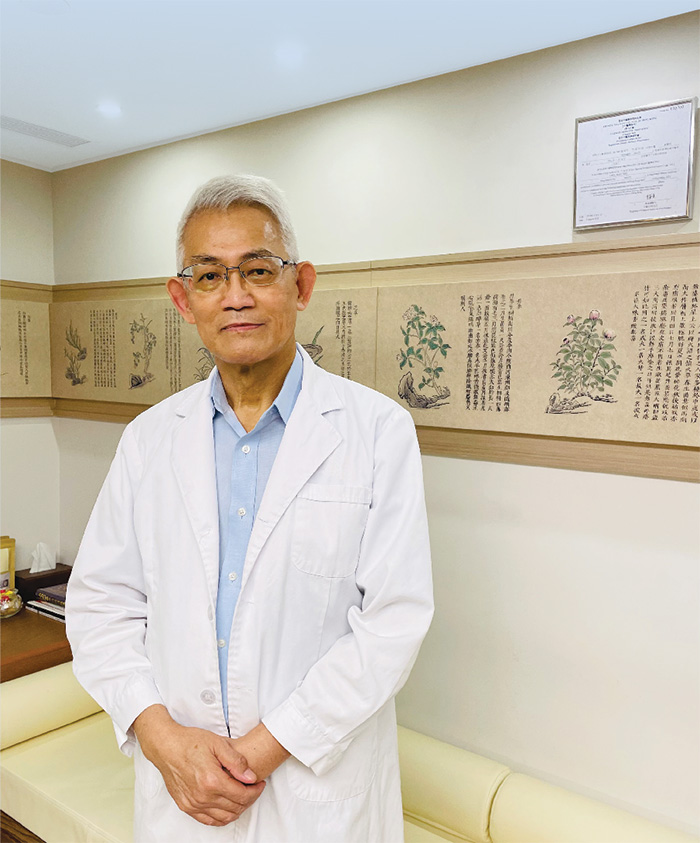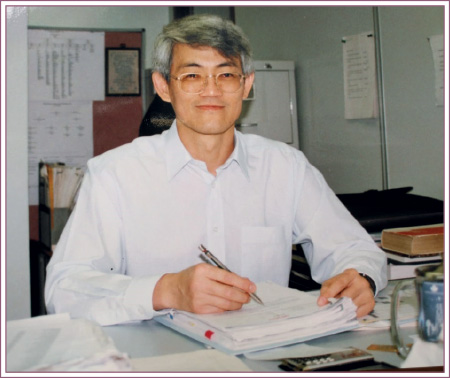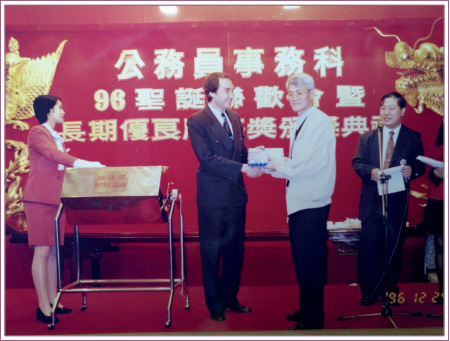


Civil Service Newsletter Editorial Board

Mr Yuen Kwok-tai was raised in a large family with seven siblings, all of whom were solely supported by his father who was a Chinese medicine practitioner. From an early age, Mr Yuen first came to know of, and develop a passion for, Chinese medicine. But instead of pursuing further studies in Chinese medicine, he decided to head straight into the workforce to help support the family after graduation from secondary school. During his thirty-eight years of service in the Government, Mr Yuen first started his career in 1971 as Labourer in the then Urban Services Department. He then joined the Clerical Assistant grade and Clerical Officer grade in 1972 and 1973 respectively and worked in the Civil Service Bureau until he retired as Senior Clerical Officer.
Over the decades, Mr Yuen has witnessed many changes in the civil service. He recalled, “In the past, everything in the Government was mainly operated manually and recorded in paper documents. Over the years, government operations and records management have changed from paper to digital formats. When I first joined the civil service, there weren’t even any calculators, so I had to do all the calculations manually. There was also no Mass Transit Railway and if we had to travel from Hong Kong to Kowloon side, it would take me an hour or two to get there, and without air-conditioning — all you could do was just use a hand fan.”
One of the major work projects that sticks out in Mr Yuen’s mind more than most during his civil service career was the development of the e-Leave System for civil servants, which was implemented in about 2003. He recalled, “I was working as Senior Clerical Officer in the Pay and Leave Division of the Civil Service Bureau which was responsible for leave policy matters of the civil service. At that time, the administration of leave application within the Government was very complicated. Civil servants employed on different terms of appointment had different leave entitlements and methods of calculations, and the leave-related civil service regulations were interrelated and extremely complicated. It was a very time-consuming and challenging task in handling leave matters and I had to address multiple enquiries from departments and colleagues, particularly those concerning expatriate civil servants on their leave calculations and how to use their leave passage allowance for making journeys back to their homeland to visit their families. I often had to search through massive old paper file records with a view to finding out the history and rationales behind particular regulations.” All of these revealed the need for computerisation of the leave management system within the Government. Mr Yuen shared, “My colleagues and I had worked very hard in collaboration with the then Information Technology Services Department on the development and implementation of the e-Leave System to streamline and automate, as far as practicable by phases, related processes ranging from leave application, processing, calculation, recording and monitoring of various types of leave. It was a huge project in terms of the complexities involved in sorting out the leave calculation rules and logics in the system development stage, as well as the service-wide implications on all government bureaux/departments and individual civil servants. This was the first flag-ship government computerisation project that involved huge number of users. It was the most memorable experience in my civil service career.” Mr Yuen was later awarded the Medal of Honour in recognition of his great efforts and contribution to this remarkable and significant computerisation project.

Mr Yuen said, “It was all worth it to pursue a career in the civil service as it has brought me a stable salary with regular working hours and good medical benefits to support my family. It also allowed me to realise my dream, i.e. starting my formal studies in Chinese medicine on part-time basis.” He recalled, “My father had opened my eyes as to how Chinese medicine could be used to help cure diseases and reduce pain in patients. He also inspired me to take up formal studies in Chinese medicine to become a practitioner. I did not take a career pathway in Chinese medicine at the very beginning as I had to get a stable job to support my family. Luckily, my civil service career has supported me in pursuing my studies in Chinese medicine!” Despite the heavy daily workload, especially during the development and implementation of the e-Leave System, Mr Yuen commenced his school life again and took up part-time studies in Chinese medicine at the Chinese University of Hong Kong and the HKU School of Professional and Continuing Education beyond work. Mr Yuen further said, “My part-time studies in Chinese medicine lasted for nine years and after that, I had my practicum across various provinces and cities in the Mainland, including Henan, Hunan, Guangxi and Shanghai to gain practical experience in Chinese medicine hospitals during all my holidays. It was quite demanding as I had no rest at all outside my daily work in the civil service and limited time to spend with my family. Fortunately my family supported me a lot throughout these years and I really appreciate that.” Mr Yuen was finally able to reap the rewards of his hard work when he graduated with a Bachelor of Chinese Medicine degree and became a registered Chinese medicine practitioner in 2004.


Upon his retirement from the civil service at the age of 58, Mr Yuen was finally able to realise his dream of pursuing a full-time career as a Chinese medicine practitioner. He mused, “When I was still a child, I was already completely immersed in the world of Chinese medicine; I imbibed so much knowledge about it and developed such passion for it from my father that it’s part of my DNA now.” He added, “My father often tested me, to check if I had listened to what he taught me about Chinese medicine. If he fell silent after my answer, I knew there was trouble brewing because I hadn’t been able to remember something from my lesson.”
Sure enough, this childhood passion has driven Mr Yuen to move promptly into a second career after retirement from the civil service. No sooner had he retired than he was recruited to work as a full-time Chinese medicine practitioner in a Chinese medicine clinic, where he had already worked part-time before retirement. Mr Yuen recalled, “I have later moved to another newly established Chinese medicine clinic, where I currently work with five other Chinese medicine practitioners. Chinese medicine nowadays is much different from the past. Modern Chinese medicine, now comes in the form of granules that can be stored easily and is more hygienic, can be taken by just dissolving with hot water, saving time to boil traditional Chinese herb formulas for hours to produce a Chinese medicine soup. Preparing Chinese medicine now is as quick and easy as making a cup of coffee. Besides, the Government has provided great support for the development of Chinese medicine in Hong Kong these years, such as more public education on the use and benefits of Chinese medicines, particular to the young people.”

Talking about the tips for realising dreams, Mr Yuen shared, “Most important of all, if you have a strong passion for something, don’t hesitate and take the actions required to go for it! Determination and time management are the keys to achievements beyond your daily work. It was not easy to overcome all the difficulties I have faced, especially the weariness after the whole day work in office. But my passion and my dream since childhood count. Although I could not develop a career in the Chinese medicine field when I was young, I am grateful for this second chance and I won’t let it go again.”
In closing, he encouraged colleagues, “Don’t always bury your head in your smartphone, or become a couch potato, instead think about your goals in life. If one of those goals is to start a new career, then plan far ahead and think about what qualifications you might need. This all takes time to attain — so think ahead in the long-term.” He added, “It’s also important to think about your own mental and physical health, as well as financial situation, so as to maintain your quality of life. Think about how long you can keep going and stay healthy, so that you can have time to achieve all your life goals.”